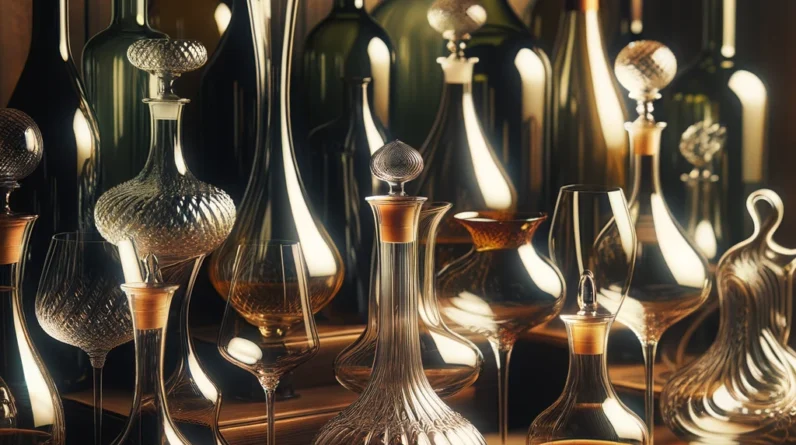
Ah, the world of decanting wine.
If you’re passionate about wine, you’ve likely heard about it.
But what’s the fuss about?
Let’s explore together what decanting wine is and how to do it.
The Art of Decanting Wine
Definition of Wine Decanting and Its Importance
Ever opened a bottle of wine and just poured it directly into a glass?
Most of us have.
But there’s an elegant middle step that can elevate your wine experience: decanting.
In its essence, decanting wine means transferring it from its bottle to another container.
Why? For clarity and character.
The Transition from Bottle to Decanter
Not all vessels are created equal.
Some are made specifically for decanting.
From the graceful swan to the utilitarian standard, decanters come in various shapes like the cornett and duck.
Each serves to aerate the wine and enhance its taste.

Why Decanting Is Essential
Sediment Separation: Ensuring a Smoother Drinking Experience
Over time, wines develop sediment.
It’s natural. But sipping on sediment isn’t the best.
That’s where decanting comes in.
It ensures your glass is clear of these gritty intruders.
CHECK OUT THIS AWESOME DECANTER!
The Power of Aeration: How It Transforms Wine’s Flavor and Aroma
Wine is alive.
It changes, evolves.
Aeration—letting it breathe—awakens dormant flavors.
It softens the bold tannins, especially in young red wines.
Your wine sings a fuller, richer song after it breathes.
Rescue Mission: How Decanting Saves the Day When a Cork Breaks
Corks.
They can be tricky.
Sometimes, they break and crumble into the wine.
A decanter, combined with a fine strainer, can be your wine’s hero, separating the unwanted cork bits from the beloved liquid.
The Wines That Love Decanting
A Universal Act: Most Wines Can Benefit from Decanting
From the robust Malbec to the light Chardonnay, wines love a good decant.
Even a brief one.
The Red Wine Allure: Why Young, Bold Red Wines Need This Step
You’ll find young reds like Shiraz and Cabernet Sauvignon pack a punch.
Decanting tames them, making them more palatable.
Highlighting Top Candidates
When thinking of decanting, think Bordeaux, Burgundy, and other big names.
These wines transform beautifully with aeration.
The Exceptions: Wines to Keep Away from the Decanter
The Sparkle Dilemma
Your Champagnes and sparkling wines?
Keep them away from the decanter.
They thrive on their bubbles.
Decanting might just steal their sparkle.
OR TRY THIS FANCY CHAMPAGNE DECANTER
Mastering the Decanting Process
Pre-Decanting Ritual
For wines stored sideways, standing them upright a day before ensures sediments settle.
It’s the prep before the magic.

Step-by-Step Guide to a Perfect Decant
Slowly pour the wine into the decanter.
Keep the angle gentle.
Watch out for sediment.
If you see any, pause, then resume.
THE BEST CHOICE FOR WINE OPENER!
Timing
You can decant hours before drinking.
But remember: find that sweet spot between immediate enjoyment and optimal aeration.
Decanter vs. Carafe: Knowing the Difference
Purpose-Driven Design
Both are vessels.
Yet, while decanters aerate, carafes serve.
Know which to use when.
Serving Wine with Flair
The Importance of Showcasing the Wine’s Identity
When serving, let your guests see the original bottle.
It’s about the experience, the story behind the wine.
Tips for Presenting Your Decanted Wine to Guests
Place the bottle next to your decanter.
It’s a nod to the wine’s origin.
Upgrading Your Decanting Experience
Must-Have Accessories
Consider a filter or aerator.
It’s like giving your wine a spa treatment.
Ensuring a Sediment-Free Wine
As you decant, use a filter to catch any stray sediment.
Decanting wine isn’t just about pouring from one container to another.
It’s a ritual, an art.
It’s about unlocking a wine’s full potential.
FAQ
Q: How long should I decant wine?
A: It varies.
Some wines benefit from hours, others just a few minutes.
Trust your palate.
Q: Is it possible to over-decant a wine?
A: Rarely, but very old wines can lose their character if decanted for too long.
Q: What do I do if my wine has too much sediment?
A: Decant slowly and consider using a filter.
Leave the last bit in the bottle.







